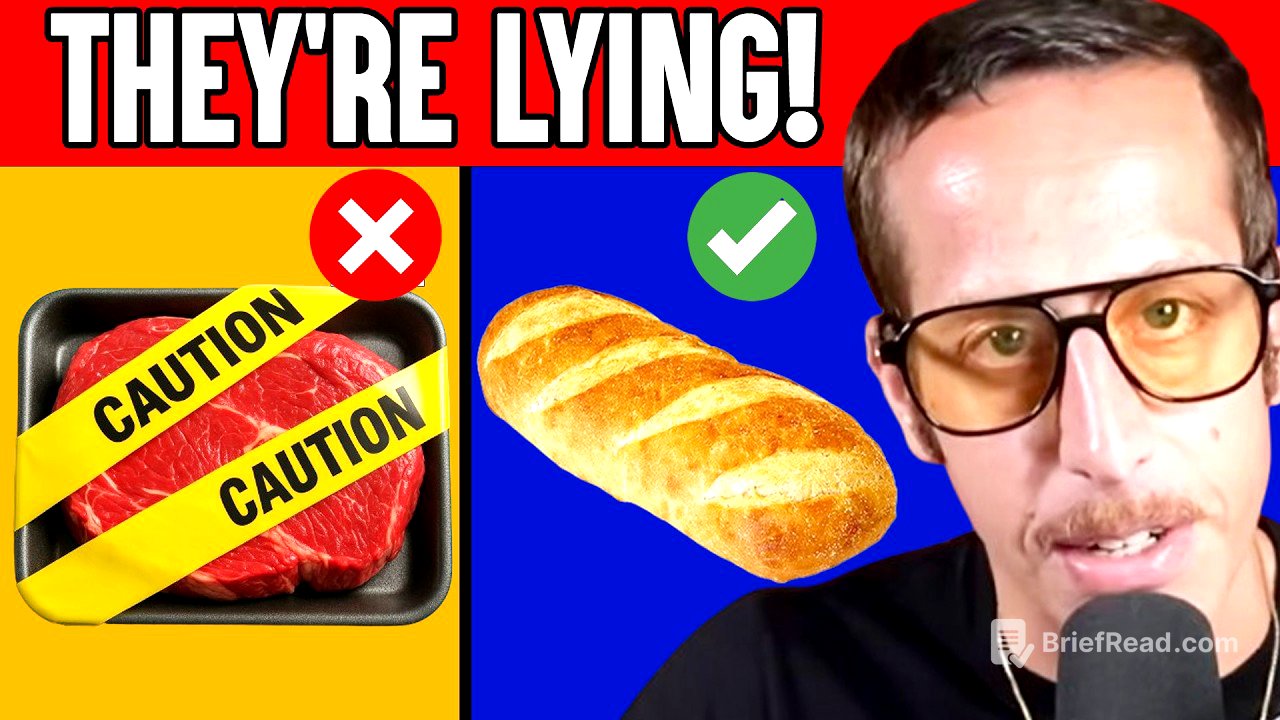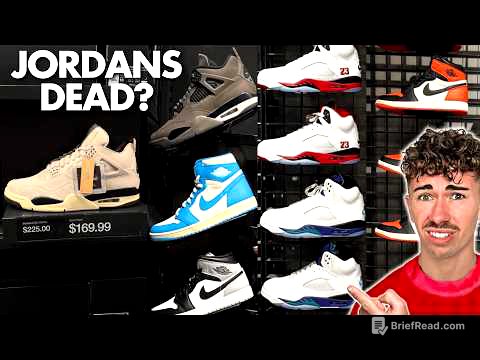TLDR;
This video exposes seven common health and nutrition myths that may be hindering your well-being. It challenges the notions that the sun is dangerous, red meat causes cancer, snacking boosts metabolism, "eat less, move more" is the best way to burn fat, carbohydrates are essential for energy, eating fat makes you fat, and genes determine your health fate. The video emphasizes the importance of sunlight for vitamin D production, the nutritional benefits of red meat, the advantages of intermittent fasting, prioritizing hormones over calories, understanding the role of carbohydrates and fats in the body, and the power of lifestyle choices in gene expression.
- Sunlight is essential for vitamin D production and overall health.
- Red meat is a nutrient-dense food that can be beneficial for health.
- Intermittent fasting is more effective for fat loss than frequent snacking.
- Hormones and inflammation are more important than calories for weight management.
- Lifestyle choices have a significant impact on gene expression and overall health.
Myth 1: The Sun Is Dangerous and Causes Cancer [0:24]
The video challenges the common belief that the sun is dangerous and causes cancer, arguing that sunlight is a healing medicine that triggers vitamin D production. Vitamin D, a hormone, regulates over 3,000 genes related to immune function, inflammation, and fat metabolism. Low vitamin D levels are linked to increased risks of cancer, obesity, autoimmune disease, depression, and metabolic dysfunction. The video cites a 20-year Swedish study that found women who avoided the sun had a mortality rate twice as high as those with regular sun exposure. Morning sunlight resets the circadian rhythm and boosts melatonin production, which is a powerful antioxidant for mitochondria. The speaker recommends getting 30-60 minutes of sunshine daily, ideally in the morning or before sunset, without sunscreen. As an alternative to sunscreen, the speaker suggests taking 6-10 mg of astaxanthin, an antioxidant, as an edible sunscreen.
Myth 2: Red Meat Causes Cancer [5:41]
The video debunks the myth that red meat causes cancer, asserting that the science does not support this fear. The World Health Organization's claim is based on observational studies with confounding factors. Grass-fed red meat is presented as one of the most nutrient-dense foods, containing heme iron, zinc, vitamin B12, carnosine, creatine, and conjugated linoleic acid, which are critical for energy, fat metabolism, and brain function. The speaker shares that 80% of his diet is red meat and his blood work is phenomenal.
Myth 3: Snacking and Grazing Boosts Your Metabolism, Helps You Burn Fat [7:09]
The video refutes the idea that snacking and grazing boost metabolism and help burn fat. Eating every 2-3 hours raises glucose and insulin, leading to fat storage. The video suggests having an eating window and a fasting window, such as two to three meals within an 8-hour window, to promote fat loss. Snacking disrupts the gut microbiome and signals the metabolism to store fat. The speaker references his book, "Metabolic Freedom," emphasizing that the goal is not to boost metabolism but to make it more efficient.
Myth 4: Eat Less, Move More Is the Best Way to Burn Fat [8:57]
The video challenges the "eat less, move more" approach to fat loss, calling it redundant and outdated. While calories matter, hormones and inflammation are more important. The "eat less, move more" model ignores insulin, hormones, and inflammation. The speaker argues that being overweight is a symptom, not a problem, and that focusing solely on cutting calories can damage the metabolism over time. The video suggests focusing on quality over quantity, consuming high-quality protein, stopping snacking, and practicing intermittent fasting.
Myth 5: Carbohydrates Are Essential for Energy Production [10:41]
The video argues that carbohydrates are optional, while glucose is essential. There are no essential carbohydrates, unlike essential fats and proteins. The body can convert protein and fat into glucose. When glucose is low, the body produces ketones, which are anti-inflammatory, fat-burning, and beneficial for brain function. The speaker does not advocate avoiding carbs altogether but questions the notion that they are the number one source of energy.
Myth 6: Eating Fat Makes You Fat [12:18]
The video clarifies that it's not fat that makes you fat, but insulin. Carbohydrates spike blood insulin levels more than protein, while fat barely moves the needle on insulin. Eating healthy fats like eggs with the yolk, avocados, butter, ghee, olive oil, and coconut oil can lower inflammation, lower insulin, and help you burn fat. The video recommends eating more protein and fat and lowering carbs to tap into stored body fat.
Myth 7: Your Genes Determine Your Health Fate [13:22]
The video emphasizes that genes are not your destiny. While you cannot change the genes you were born with, you have control over their expression. Lifestyle decisions determine whether you turn on or off genes. The speaker argues that minimally 95% of your genes are expressed through your lifestyle decisions, meaning less than 5% of all diseases are strictly genetic. The video encourages viewers to take control of their health by making informed lifestyle choices.
Q&A: Improving Insulin Sensitivity and Healthy vs. Unhealthy Fats [15:39]
The video answers the question of how to improve insulin sensitivity naturally by recommending eating more red meat, protein, and fat, reducing carbs, getting quality sleep, building lean muscle mass through strength training, and consuming one gram of protein per pound of ideal body weight. It also differentiates between healthy and unhealthy fats, listing coconut oil, butter, ghee, beef tallow, olive oil, duck fat, and avocado oil as healthy options for cooking and salad dressings. Healthy meat sources of fat include eggs, avocados, red meat, wild-caught small fatty fish like salmon, and organ meats. Unhealthy fats to avoid include vegetable and seed oils like canola, corn, cottonseed, sunflower, soybean, safflower, rice bran, and grapeseed oil, as well as fish oil.









